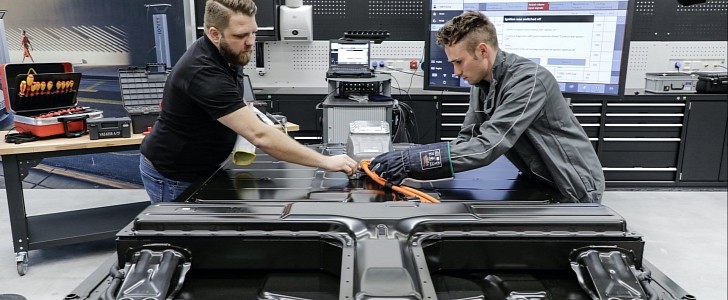Porsche has introduced a multi-stage service concept for high-voltage batteries. The idea behind it is to ensure that service technicians will have a methodology to rely on when dealing with high-voltage batteries, and they will have options when one or more cells will be affected. Battery repairs will be a necessity in the future, and Porsche wants to be ahead of the curve on this one.
As Porsche explains, a Taycan and its derivatives have 28 or 33 battery modules, depending on capacity. Through the methods developed by the German company, technicians will be able to open the battery housing, and then they can conduct detailed repairs.
While it would be simpler for the manufacturer to just replace the entire battery at the customer's expense, that would be the worst nightmare for the latter cost-wise, and it would not be sustainable to do so. Instead, Porsche wants to be sure that batteries with issues will not lead to more waste, and that they continue to offer an advantage to their customers from a price perspective.
Technicians already have tools to determine the capacity and condition of the high-voltage battery, and with the help of the diagnostic tester in the workshop, they can tell which module will need to be replaced even before opening up the battery. The good news is that the company has also considered this, and solutions are developed in case issues arise.
Later, Porsche wants to offer an in-app solution to enable customers to check the health status of their vehicle's high voltage battery without having to schedule a visit to the dealer. The latter part is going to be important when more and more electric vehicles will change hands between private owners.
In case a cell module will no longer be fit for use in a vehicle battery, but it will still be functional, as many are when they cannot provide enough range, it will be used for stationary tasks. For example, it could be a part of a larger battery that is sold by a third party to a consumer who has solar or wind power installed in their home.
Since Porsche has procedures to repair high-voltage batteries, the company and its dealers will have a procedure for used or defective battery cells, which will prevent those from reaching landfills.
Instead, they will go to second-life programs, where they can have a long career as buffers. The latter is another idea that Porsche experimented with recently.
While it would be simpler for the manufacturer to just replace the entire battery at the customer's expense, that would be the worst nightmare for the latter cost-wise, and it would not be sustainable to do so. Instead, Porsche wants to be sure that batteries with issues will not lead to more waste, and that they continue to offer an advantage to their customers from a price perspective.
Technicians already have tools to determine the capacity and condition of the high-voltage battery, and with the help of the diagnostic tester in the workshop, they can tell which module will need to be replaced even before opening up the battery. The good news is that the company has also considered this, and solutions are developed in case issues arise.
Later, Porsche wants to offer an in-app solution to enable customers to check the health status of their vehicle's high voltage battery without having to schedule a visit to the dealer. The latter part is going to be important when more and more electric vehicles will change hands between private owners.
In case a cell module will no longer be fit for use in a vehicle battery, but it will still be functional, as many are when they cannot provide enough range, it will be used for stationary tasks. For example, it could be a part of a larger battery that is sold by a third party to a consumer who has solar or wind power installed in their home.
Since Porsche has procedures to repair high-voltage batteries, the company and its dealers will have a procedure for used or defective battery cells, which will prevent those from reaching landfills.
Instead, they will go to second-life programs, where they can have a long career as buffers. The latter is another idea that Porsche experimented with recently.










